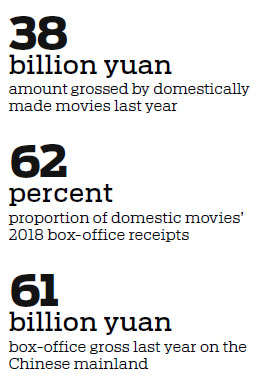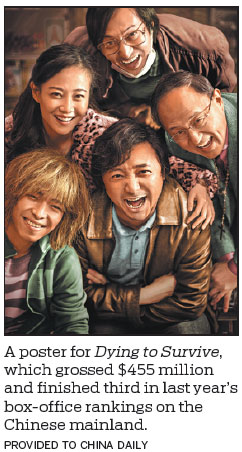Film market focuses on new approach
Real-life stories, social issues attract audiences
Chinese films are holding their own, and then some, amid longtime competition.
Last year, domestic feature films grossed nearly 38 billion yuan ($5.6 billion), a year-on-year rise of nearly 26 percent and accounting for some 62 percent of the nation's box-office revenue, with the latter rate marking the highest since the Chinese film industry started to take off in the early 2000s.
As the world's second-largest film market, China last year produced 1,082 movies, including 902 feature-length dramas, 51 animated films, 57 documentaries and 61 science-centered educational movies, according to the China Film Administration, the top regulator for the sector.

This momentum is expected to continue. Up to 12 new movies, the most for at least five years, will open on Feb 5 - the first day of the Year of the Pig.
Movies shown during the weeklong Spring Festival holiday last year earned 5.65 billion yuan, topping the global box-office charts in terms of revenue. Spring Festival is one of the country's most lucrative holidays for the box office, with the others being the National Day break and summer vacation.
Last year, cinema goers in urban areas reached 1.72 billion, up by nearly 6 percent year-on-year.
As more people flock to theaters, their consumption habits become increasingly connected to the internet. A report from the Maoyan Research Institute, a subsidiary of Maoyan Entertainment, shows that last year 84.5 percent of tickets were bought online, a rise of 2.8 percentage points from the previous year.
The report also shows that young people in third- and fourth-tier cities have become used to going to movie theaters to celebrate Spring Festival.
But during the rest of the year, movie theater admissions in these cities have been falling, the report said.
Zuo Heng, deputy director of the cinematic culture research department at the China Film Archive, said, "In recent years, watching a film during Spring Festival has almost become a new custom for Chinese families."
Rao Shuguang, president of the China Film Critics Association, said the floods of Chinese moviegoers during Spring Festival have also been seen during the Dragon Boat Festival and on Qingming, or Tomb-sweeping Day.
But when speaking about last year, which grossed nearly 61 billion yuan, a year-on-year rise of 9.06 percent, most industry insiders and researchers said it is not the figures that will stay in the mind.
Zuo said that last year "will be remembered as a game-changing one in the history of Chinese cinema. Most of the successful films were based on real-life stories, or explored social issues. It was a revitalization of cinematic realism."
While Hollywood is dominated by movies about superheroes, China has seen a shift in tastes. Realistic themes - a rare formula for box-office hits - attracted vast audiences who previously flocked to action-studded blockbusters and domestic comedies.
Operation Red Sea and Dying to Survive, top and third respectively in last year's box-office charts, were both based on true stories.
Operation Red Sea, a directorial hit for Hong Kong veteran Dante Lam, is loosely inspired by the People's Liberation Army Navy's evacuation of nearly 580 Chinese nationals from war-torn Yemen in early 2015.
Lam skillfully blends action sequences and depictions of military heroes to resonate with Chinese audiences. He is regarded by some critics as China's Michael Bay, a reference to the United States filmmaker known for producing and directing big-budget, high-concept action films.
Yin Hong, a professor of film and TV communication at Tsinghua University, said Operation Red Sea had raised the bar for military films, signaling the rise of Chinese filmmaking technologies.
Zhong Chengxiang, head of the China Literature and Art Critics Association, said the blockbuster's main draw is that it demonstrates some of the Chinese navy's cutting-edge weapons and new strategies.
China has produced many military-themed films, most of them set in the War of Resistance Against Japanese Aggression (1931-45).
Jiang Yong, a film industry analyst in Beijing, said that following the success of Wolf Warrior 2, the country's highest-grossing film, Operation Red Sea reinforced investors' confidence that a realistic contemporary film could also be a commercial success.
In addition to epics studded with special effects, a string of social dramas reflecting changes in China or examining the lives of ordinary people have also won critical acclaim and market success.
Dying to Survive, starring A-list actor Xu Zheng, was the talk of the country when it was released in July.

Based on the true story of Lu Yong, a leukemia patient who illegally bought unlicensed anticancer drugs overseas for himself and many other patients, the movie touched Chinese audiences and triggered public recognition for struggling families who cannot afford life-saving medication.
Lin Yang, a diehard film fan in Beijing, said, "Before Dying to Survive was screened, we had complained that Chinese filmmakers could not make excellent social dramas such as Dangal or The Crucible. But now we are proud that China has such films."
Dangal is an Indian hit about a former wrestler who resists social bias to train his two daughters to become top athletes. The South Korean movie The Crucible, which is based on a real-life scandal, focuses on sexual assaults of teenagers.
Nearly two weeks after Dying to Survive was released on July 5, Premier Li Keqiang again urged government departments to speed up efforts to reduce the price of drugs to treat cancer and reduce the burden on families.
Miao Yue, a director known for realistic films such as the award-winning Hold Your Hands, said: "China will see more and more such films. Investors have become more interested in financing such stories and are willing to raise budgets."
She said local talent has realized the importance of shaking off stereotypical depictions of role models or heroic protagonists to make more emotional and humane stories, marking a significant improvement for Chinese cinema.
Orlogo, dean of the fine arts department at the Beijing Film Academy, who has only one name, said his department recently received post-production jobs for two "serious" films - one of them chronicling household musician Xian Xinghai's times in Kazakhstan.
"Xian's biographical drama required us to digitally recreate streets and houses in Kazakhstan ruined during wartime. In the past, few such films set aside part of their budgets for special-effect sequences," Orlogo said.
A few years ago, star-studded casts and spectacular visuals had a big impact on ticket sales, but now, word-of-mouth recommendations from audiences play a more decisive role in a film's market performance.
For instance, Lost, Found, a heartfelt story about child abduction starring A-list actresses Yao Chen and Ma Yili, surpassed the highly anticipated comedy Hello, Mrs Money and award-winning director Zhang Yimou's martial arts epic Shadow to become a sleeper hit during the National Day holiday.
Facing off against powerful Hollywood rivals including Wreck-It Ralph and Fantastic Beasts: The Crimes of Grindelwald, the Chinese movie A Cool Fish surprisingly beat them to dominate the box-office charts in late November. This dark comedy tackles hot social issues.
Zhong Dafeng, a professor with the Beijing Film Academy, said: "Such success will encourage more talented people to join the creation of realistic stories. They can use their influence to boost the development of society."
The younger generation in China has become used to watching English-subtitled films, and foreign movies - especially Hollywood blockbusters - still make up a large part of the country's market. Last year, more than 120 imported films grossed 23.1 billion yuan, accounting for nearly 38 percent of total receipts.
Superhero stories also won an overwhelming victory over other foreign competitors.
Avengers: Infinity War was the highest-grossing imported film last year, followed by Venom in second place and Aquaman in third. But industry insiders said they have sensed some changes.
With an uncommonly high 25 percent stake from Tencent Pictures, the film arm of internet giant Tencent, Sony's Venom was given a rare 30-day release extension on the Chinese mainland, and earned more in the country than in North America, according to the Maoyan report.
Investing in potential Hollywood hits has become a new trend for China's cash-rich film companies, according to observers.
Alibaba-backed Alibaba Pictures had a stake in Mission: Impossible - Fallout, starring Tom Cruise, which earned 1.25 billion yuan in the summer. The Beijing company, which has set up an office in the United States, said recently it also invested in Green Book, which won three awards at the 76th Golden Globes.
While the North American film market saw a 7.3 percent rise in growth year-on year in 2018, China saw expansion of 9.1 percent, showing that the country had narrowed the gap, the Maoyan report said.

In addition to the US, which released 23 films in China last year, Japan was the next-highest with 15 - including Shoplifters, which won the 2018 Palme d'Or at the Cannes Film Festival. But it was India that saw explosive growth, with nine Bollywood films released in China last year, compared with one in 2017 and two in 2016.
Jiang, the Beijing analyst, said: "Aamir Khan is the most popular Indian star in China. But the flop of his latest epic, Thugs of Hindostan, in China shows that domestic audiences are becoming more sophisticated. If they dislike the story, they will not buy tickets despite admiring the star."
Thugs of Hidostan, the most expensive film made in India, garnered six points out of 10 on popular review site Douban.com, the lowest of all Khan's films released in China.
With the Year of the Pig approaching, most researchers believe that 2019 will offer better prospects for filmmakers in China and elsewhere, despite some uncertainties in the market.
New movie theaters and screens have emerged nationwide. By the end of 2018, the country had 60,079 screens, of which 9,303 were installed during the year.
Last month, the China Film Administration issued a notice to encourage provincial- and city-level authorities and urban movie theaters to speed up construction, tasking them with installing more than 80,000 screens by next year.
Rao, the China Film Critics Association president, said: "China will see an increasingly sophisticated film market in 2019. While first-tier cities such as Beijing and Shanghai prefer imported blockbusters or high-rated films, comedy, a traditionally lucrative genre, will still be welcomed in smaller cities."
Yin, from Tsinghua University, said that with two highly anticipated sci-fi films - Ning Hao's Crazy Alien and Guo Fan's The Wandering Earth - screening on the first day of the Lunar New Year, China will see a breakthrough in the creation of domestic sci-fi films, which Hollywood has dominated for decades.
xufan@chinadaily.com.cn
(China Daily 01/23/2019 page1)


















